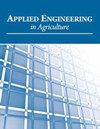井水灌溉对土壤盐分和冬小麦生长的影响
IF 0.9
4区 农林科学
Q4 AGRICULTURAL ENGINEERING
引用次数: 0
摘要
矿井水灌溉对冬小麦株高生长有促进作用,但对叶面积生长有抑制作用。高矿化度井水灌溉会抑制冬小麦的生长发育,降低产量。矿井水与清水混合灌溉(比例为1:1)有利于冬小麦的生长。短期井水灌溉不会造成土壤盐碱化。在中国北方作物和矿产生产重叠的地区,灌溉用水严重短缺。解决这一问题的关键是安全高效地利用矿井水。通过2012 ~ 2014年2年的田间试验,研究了矿井水灌溉(MI)、矿井水与清洁水混合灌溉(MIMC)、矿井水与清洁水轮作灌溉、矿井水先灌溉、清洁水再灌溉(RIMC)和清洁水灌溉(CK)对冬小麦生长和土壤盐分的影响。结果表明,不同灌溉方式对小麦株高无显著影响,但对小麦叶面积有明显抑制作用。与对照相比,MI处理的株高增加1.0% ~ 3.4%,叶面积增加69.5% ~ 81.9%。与对照相比,MIMC的产量提高了2.6% ~ 6.67%,RIMC和MI的产量分别降低了3.4% ~ 21.1%和10.4% ~ 11.2%。高盐度的MI会抑制冬小麦的生长发育,降低产量和品质,而MIMC的产量高于CK,可以改善冬小麦的品质。长期使用高矿化度的矿井水灌溉会增加土壤盐碱化的风险,而MIMC可以提高土壤肥力。关键词:生长,灌溉,矿井水,土壤盐分,冬小麦本文章由计算机程序翻译,如有差异,请以英文原文为准。
Effects of Mine Water Irrigation on Soil Salinity and Winter Wheat Growth
HighlightsMine water irrigation can promote the plant height growth of winter wheat, but inhibit the growth of leaf area.High salinity mine water irrigation will inhibit the growth and development of winter wheat and reduce the yield.Mixed irrigation of mine water and clean water (the ratio is 1:1) is beneficial to the growth of winter wheat.Short-term mine water irrigation will not cause soil salinization.Abstract. There is a serious shortage of irrigation water in the overlapped areas of crop and mineral production in North China. The key to solve the problem is to utilize mine water safely and efficiently. The effects of mine water irrigation (MI), mixed mine water and clean water irrigation (MIMC), rotational mine water and clean water irrigation, irrigated with mine water first, then clean water (RIMC) and clean water irrigation (CK) on winter wheat growth and soil salinity were studied through two years of field trials (2012 to 2014). The results showed that different models of mine water irrigation had no difference in plant height, but had obvious inhibitory effect on leaf area of wheat. Compared with CK, MI increased plant height by 1.0% to 3.4%, and leaf area was 69.5% to 81.9% of that of CK. Compared with CK, the yield of MIMC was increased by 2.6% to 6.67%, and the yield of RIMC and MI was decreased by 3.4% to 21.1% and 10.4% to 11.2%, respectively. The MI with high salinity could inhibit the growth and development of winter wheat, and reduce the yield and quality, while the yield of MIMC was higher than that of CK, and could improve the quality of winter wheat. Long-term irrigation of using mine water with high salinity will increase the risk of soil salinization, but MIMC can improve soil fertility. Keywords: Growth, Irrigation, Mine water, Soil salinity, Winter wheat.
求助全文
通过发布文献求助,成功后即可免费获取论文全文。
去求助
来源期刊

Applied Engineering in Agriculture
农林科学-农业工程
CiteScore
1.80
自引率
11.10%
发文量
69
审稿时长
6 months
期刊介绍:
This peer-reviewed journal publishes applications of engineering and technology research that address agricultural, food, and biological systems problems. Submissions must include results of practical experiences, tests, or trials presented in a manner and style that will allow easy adaptation by others; results of reviews or studies of installations or applications with substantially new or significant information not readily available in other refereed publications; or a description of successful methods of techniques of education, outreach, or technology transfer.
 求助内容:
求助内容: 应助结果提醒方式:
应助结果提醒方式:


